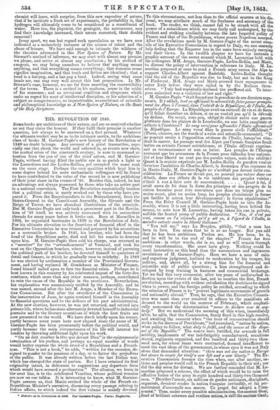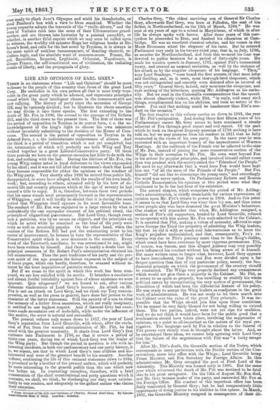TAT:, REVOLUTION OF 1848.
Sown books are ambitious-of their nature, and are so received whether or not they claim the honour. If they fulfil their promise is another
question, not always to be answered on a first perusal. Whatever the ultimate verdict may be as to its intrinsic merits, to the ambitious class of hooks M. Garnier-Pages's new history of the Revolution of
1848 no doubt belongs. Any account of a great transaction, espe- cially one that shook the world and ushered in, as events now show, the central crisis of the nineteenth century, is sure to command at- tention from the pen of one of the chief actors, and M. Gamier- Pages, without having filled the public eye in so garish a light as the Lamartines and the Ledru-Rollins, yet occupied the same rank on the same stage. Perhaps the very qualities which kept him in some degree behind his more enthusiastic colleagues will be tbund to have contributed to the value of the record he is now publishing of their joint share in the events of '43. Besides this, indeed, he has an advantage not always possessed by those who take an active part in a national convulsion. The First Revolution emphatically teaches that a political crisis is rarely worked out by those who have pre- pared it. From the Encyclopaedists to the States-General, from the States-General to the Constituent Assembly, the Gironde and the Risign of Terror, we have abundant illustrations of the principle. Brat M. Garnier-Pages not only took a prominent part in the Revolu- tion of '48 itself, he was actively concerned with its antecedent threads for many years before it broke out. Born at Marseilles in 1805, he organized barricades in 1830 in the Revolution of July. For his ultimate elevation to the functions of financial chief in the Executive Commission he was trained and prepared by his avocations as a mercantile broker. In 1841, his brother, who had been the head of the Republican party, died and left his mantle to descend upon him. M. Gamier-Pages then sold his charge, was returned as a "member" for the "arrondissement" of Verneuil, and took his seat on the Oppositiorrbenches, where, however, instead of pursuing the political path of his brother, lie devoted himself to questions of detail and finance, in which he gradually rose to celebrity. In 1848 he was elected by acclamation a member of the Provisional Govern- ment, and having replaced M. Gendchaux as Minister of Finance, found himself called upon to face the financial crisis. Perhaps he is best known in this country by his celebrated impost of the forty-five centimes; which more than any other measure, perhaps, contributed to-ruin the cause of the Republic in the provinces. Nevertheless, his explanation was unanimously ratified by the Assembly, and he was named, second after the late M. Arago, a Member of the Execu- tive Commission. But after the overthrow of the Commission in the insurrection of Jane, he again confined himself in the Assembly tcnflnancial questions and to the defence of his past administration. At the new election, however, he was not returned, and retired into private life; where he has since alternately devoted himself to industrial pursuits and to the literary avocations of which the first fruits are now presented to the world. We have dwelt briefly upon his career, partly because some years have now elapsed since the name of M. Garnier-Pages has been prominently before the political world, and partly because the main circumstances of his life will interest his readers by throwing additional light upon his work. "'On ne doit courber la tete que devant Dieu" is the epigrammatic termination of his preface, and perhaps no equal number of words would better express the whole creed of a Republican and a French- man. "This is not a book," he adds, " written for the occasion, de- signed to pander to the passions of a day, or to flatter the prejudices of the public. It was already written before the last Italian war, which has changed the state of parties. But I have retained its first originality intact, in deference to suggestions any departure from which would have seemed a profanation." The allusion, we learn in the-next line, is to the celebrated Venetian, whose political remains are now on our tables. It is interesting to know, what M. Gamier- Pages assures, us, that Mania revised- the whole of the French ex- Republican Minister's narrative, discussing-every passage relating to Italian affairs, to which indeed the first volume is mainly devoted: • Histare de la Rivolution *1848. Par Gagoisa■Pagts. Pagaerre. To this circumstance, not less than to the official sources at his dis_ posal, we may attribute much of the freshness and accuracy of the book. The reader, we think, cannot fail to be struck with all the power of a coincidence which we may fairly call undesigned, by the evident and striking similarity between the late Imperial policy of France and that of the Republicans, whose power Napoleon usurped. After the revelations made by M. Gamier-Pages of the secret coun- cils of the Executive Commission in regard to Italy, we can scarcely help feeling that the Emperor has in the main been actively carrying out their views. In the twelfth chapter we have for instance a graphic account of the secret council which M. Lamartineheld with his colleagues MM. Arago, Garnier-P.ages, Ledru-Rollin, and Marie, to discuss the policy of intervention in reference to Italy. M. La- martine proposed at once to send a French army across the Alps to support Charles-Albert against . Radetzki. Ledru-Rollin thought that the aid of the Republic was due to Italy, but not to the. Bing of Piedmont. MM. Arago and Marie avowed their repugnance to enter Italy before they were called in by the Italians them- selves. " Italy had repeatedly declined the proffered aid. To inter- pose uninvited was a violation of law and right." M. Gander-Pages " etait frappe par la grandeur de ces &rulers argu- ments. II y cidait, tout en affirmant la necessitedefaire passer prompte- ment les .4fpes a farmed, dans Pintere? de la .Repabligue, de l'Italie, des peuples de P Europe. La Republique avaitumsurcrolt de vie et de force
fallait epancher au dehors, si on ne voulait pas gull la divorat
au dedans. On serait, sons pen, oblige de choisir entre une guerre glorieuse dans les plaines de la Lombardie, on une lutte sanglante et nefaste a l'interieur! Le sang versdpour affranchir PRalie afermirait da Re'publique. Le sang verse dans la guerre &de l'affhiblirait." (These, observe, are the words of a calm and scientific economist). "II
ne pouvait croire a l'opposition serieuse de Pltalie, Iorsqu'on vien- drait la sauver. Le passage seul des Alpes par Parra& francaise ferait battre en retraite l'armee autrichienne, et l'Italie dilivree exprime- reit sa reconnaissance et non sa haine. Les peuples de l'Europe verraient que les promesses de la France pour defendre leer nationa-
lite et lent liberty ne sont pas des paroles vaines, mais des realites! Quant a la erainte exprimee par M. Ledru-Rollin de paraltre vouloir favoriser l'ambition de Charles-Albert, la formation (Fun royaume de in Haute-Italie, M. Garnier-Pages ne s'arretait pas avant cette con- sideration. La France ne devait pas, ne pouvalt pas eutrer dans ces, details, dans ces debats de la vie interieure des peuples voisins ; c'etait a eux it faire acte de souverainete. . . . Quanta lui, avait assez de foi dans la force des principes et des progre.s de In raison humaine pour etre convaincu que dans un temps plus on moms, court, plus ou moms long, les peuples choisiraient la forme qui facilite le mieux leer diveloppement : la forme republicaine." From the Privy Council M. Gamier-Pages leads us into the As- sembly, where it is not a little interesting,,having. been behind the scenes, to note how M. Lamartine, having taken his cue in private, unfolds the heated pomp of public declaration. "Non, n'est pas- oral, comme on Pa ripen*, y ait eu, a Pe7gard de PItatie, la
moindre entente centre la aerie italienne."
" You tell me," says La Bruyere, pithily, " that a man has
been in rove. You mean that he is so no longer. But you add that he has been ambitious. Pardon me. He has been, he is, and he will be to the end of the chapter." France has been ambitious : in other words, she is so, and so will remain thnaugh every transformation. She must have glory. Nothing could be
i
more instructive on this head than the unconscious and ingenuous revelations of M. Gamier-Pages. Here we have a man of calm And sagacious judgment, inclined to moderation by his temper, his politics, and, above all, by a strong bias for the financial and scientific side of public questions ; a bias strengthened and de- veloped by long training in business and commercial brokerage. Yet we find this very economist, after ten years of undisturbed re- flection upon the events of the last, not to mention the first, French ;revolution, recording with evident satisfaction the doctrines he signed when in power, and the foreign policy lie ratified, according to which the mission of Fiance is to "protect legitimate movements of growth and nationality abroad." True, he says, that the Executive Commis- sion was more than ever resolved to adhere to the manifesto ad- dressed to the world 'on the morrow of February, which emphati- cally announced the determination "never to dectare war to any- body." But we understand the meaning of' this when, immediately after, he adds, that the Commission, firmly fixed in this high resolve, and awaiting the moment when "the hour of reconstruction should strike in the decrees of Providence," had examined, "nation by nation, what policy to follow, what duly to fajl, and the means at the dispo- sal- of the Republic." The coasts were fortified, the arsenals in full activity, implements of war indefatigably manufactured, munitions stored, regiments organized, and five hundred and thirty-two thou- sand men, for whom loans were contracted, deemed insufficient to meet the vast ideas of the government, in whose eyes it was not Italy alone that demanded attention: " there was not one nation in Europe bet strove to create for itself a new life and a new liberty." The Ex- ecutive Commission foresaw the time when, one after another, na- tions and peoples would' call in the French Republic to their aid ; nor did the day seem far distant. We are further reminded that M. La- martine proposed' a scheme, the effect of which would be to raise the effective forces of the army to eight hundred and thirty-two thousand men. "Derriere l'arrcee, six millions de gardes nationaux,
organises, devaient rendre in nation fraucame invincible, et lin per- mettraient d'accomprir son oeuvre. Ce projet fut adopte a rune- nimite." Thus, under every possible administration, the ancient Gull, fond of brilliant schemes and restless action, is still the ancient Gaul;
ever ready to climb Jove's Olympus and wield his thunderbolts, or steal Pandora's box with a view to bless mankind. Whether the young coquette adopts the travestie of the "vieille devote," and the sons of Voltaire rush into the arms of their Ultramontane grand- mother, and are thrown into hysterics by a pointed pamphlet, or whether, in another fitful caprice which we may soon be called upon to witness, the worldly old spinster flings her religious books at Re- becca's head, and calls for the last novel by Feydeau, it is always in the same spirit of reckless inconsequence, of dazzling- rhetoric, re- sistless logic, and the absolute want of common-sense. France, Re- gal, Republican, Imperial, Legitimist, Orleanist, Napoleonic, is always France, the self-constituted sun of civilization, the radiating centre of liberty, and the propaganda of glory.































 Previous page
Previous page